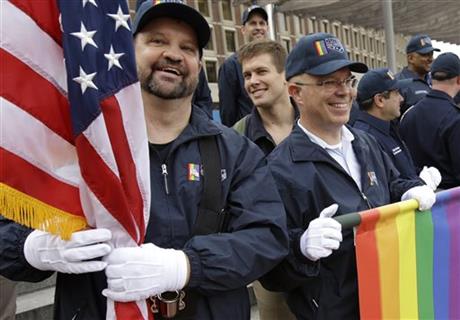
By MARK PRATT
For the first time in its history, the sponsors of Boston’s St. Patrick’s Day parade will allow a group representing the gay community to participate, drawing cheers from Mayor Martin Walsh, who boycotted the event last year over the exclusion.
The South Boston Allied War Veterans Council, which has long resisted the inclusion of gay groups and won a U.S. Supreme Court decision in 1995 upholding their right to ban them from the annual parade that draws hundreds of thousands of spectators, voted 5-4 on Monday night to allow the group OutVets to march in the parade scheduled for March 15.
They will be allowed to carry a blue banner with five white stars representing the branches of the military and six vertical rainbow stripes. The group represents lesbian, gay, bisexual and transgender veterans and participated in the city’s Veterans Day parade last month.
“Mayor Walsh has been advocating for an inclusive parade for quite some time,” spokeswoman Kate Norton said in a statement Tuesday. “We’re thrilled to hear that the South Boston Allied War Veterans Council has decided to make the 2015 parade an inclusive event.”
OutVets is being allowed to participate because of their members’ military service, and sexual orientation was irrelevant in the vote, said Brian Mahoney, commander of the veterans council. The parade is meant to honor veterans and Irish-American heritage, and OutVets met the criteria, he said.
“It was a group of vets who wanted to march and we said ‘Yeah,’ ” he said Tuesday.
Bryan Bishop, OutVets founder and a 20-year U.S. Air Force veteran, said he was “ecstatic” with the vote and agreed that the decision was based primarily on veteran status.
“We’re marching as veterans who happen to be gay,” said Bishop, who works as chief of staff in Boston’s Veterans Services agency. “We honor the sacrifices of LGBT veterans and their families and the sacrifices all veterans.”
Parade organizers have long resisted the inclusion of gay groups, and some members of the council continue to hold out.
Lead organizer Philip Wuschke Jr. said the vote was illegal because there was no quorum.
“I’m sending a letter to the commander saying he held an illegal meeting and an illegal vote,” Wuschke said. “He did not follow the bylaws of the council.”
Mahoney disputed that. “I feel safe in saying that last night’s vote was legal,” he said.
State courts forced parade sponsors to allow the Irish-American Gay, Lesbian and Bisexual Group of Boston to march in the parade in 1992 and 1993. In 1994, the sponsors canceled the parade rather than allow the group to participate.
The U.S. Supreme Court ruled unanimously in 1995 that Massachusetts courts had previously violated the parade sponsors’ First Amendment rights when they forced them to allow the group to participate.
The parade, which organizers say has been held since 1901, was in negotiations last year to allow the LGBT group MassEquality to march, but things fell apart at the last moment, and Walsh, the son of Irish immigrants, boycotted the parade. Other top Massachusetts politicians have for decades refused to participate in the parade because the exclusion of gay groups.



